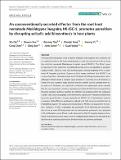Files in this item
An unconventionally secreted effector from the root knot nematode Meloidogyne incognita, Mi-ISC-1, promotes parasitism by disrupting salicylic acid biosynthesis in host plants
Item metadata
| dc.contributor.author | Qin, Xin | |
| dc.contributor.author | Xue, Bowen | |
| dc.contributor.author | Tian, Haiyang | |
| dc.contributor.author | Fang, Chenjie | |
| dc.contributor.author | Yu, Jiarong | |
| dc.contributor.author | Chen, Cong | |
| dc.contributor.author | Xue, Qing | |
| dc.contributor.author | Jones, John | |
| dc.contributor.author | Wang, Xuan | |
| dc.date.accessioned | 2021-12-21T12:30:17Z | |
| dc.date.available | 2021-12-21T12:30:17Z | |
| dc.date.issued | 2021-12-19 | |
| dc.identifier | 277164652 | |
| dc.identifier | 100c0868-2a97-465d-ac57-d90c6b427729 | |
| dc.identifier | 85121456895 | |
| dc.identifier | 000731414500001 | |
| dc.identifier.citation | Qin , X , Xue , B , Tian , H , Fang , C , Yu , J , Chen , C , Xue , Q , Jones , J & Wang , X 2021 , ' An unconventionally secreted effector from the root knot nematode Meloidogyne incognita , Mi-ISC-1, promotes parasitism by disrupting salicylic acid biosynthesis in host plants ' , Molecular Plant Pathology , vol. Early View , 13175 . https://doi.org/10.1111/mpp.13175 | en |
| dc.identifier.issn | 1464-6722 | |
| dc.identifier.other | RIS: urn:6E88E0EAC8C8B6B48982C9277A1DC7D4 | |
| dc.identifier.uri | https://hdl.handle.net/10023/24551 | |
| dc.description | Research Funding National Natural Science Foundation of China. Grant Numbers: 31872923, 31371922. Scottish Government Rural and Environmental Science and Analytical Services Division. | en |
| dc.description.abstract | Plant-parasitic nematodes need to deliver effectors that suppress host immunity for successful parasitism. We have characterized a novel isochorismatase effector from the root-knot nematode Meloidogyne incognita, named Mi-ISC-1. The Mi-isc-1 gene is expressed in the subventral oesophageal glands and is up-regulated in parasitic-stage juveniles. Tobacco rattle virus-induced gene silencing targeting Mi-isc-1 attenuated M. incognita parasitism. Enzyme activity assays confirmed that Mi-ISC-1 can catalyse hydrolysis of isochorismate into 2,3-dihydro-2,3-dihydroxybenzoate in vitro. Although Mi-ISC-1 lacks a classical signal peptide for secretion at its N-terminus, a yeast invertase secretion assay showed that this protein can be secreted from eukaryotic cells. However, the subcellular localization and plasmolysis assay revealed that the unconventional secretory signal present on the Mi-ISC-1 is not recognized by the plant secretory pathway and that the effector was localized within the cytoplasm of plant cells, but not apoplast, when transiently expressed in Nicotiana benthamiana leaves by agroinfiltration. Ectopic expression of Mi-ISC-1 in N. benthamiana reduced expression of the PR1 gene and levels of salicylic acid (SA), and promoted infection by Phytophthora capsici. The cytoplasmic localization of Mi-ISC-1 is required for its function. Moreover, Mi-ISC-1 suppresses the production of SA following the reconstitution of the de novo SA biosynthesis via the isochorismate pathway in the cytoplasm of N. benthamiana leaves. These results demonstrate that M. incognita deploys a functional isochorismatase that suppresses SA-mediated plant defences by disrupting the isochorismate synthase pathway for SA biosynthesis to promote parasitism. | |
| dc.format.extent | 14 | |
| dc.format.extent | 1723275 | |
| dc.language.iso | eng | |
| dc.relation.ispartof | Molecular Plant Pathology | en |
| dc.subject | Effector | en |
| dc.subject | Isochorismatase | en |
| dc.subject | Meloidogyne incognita | en |
| dc.subject | Parasitism | en |
| dc.subject | Plant immunity | en |
| dc.subject | Salicylic acid | en |
| dc.subject | Secretion activity | en |
| dc.subject | QK Botany | en |
| dc.subject | NDAS | en |
| dc.subject.lcc | QK | en |
| dc.title | An unconventionally secreted effector from the root knot nematode Meloidogyne incognita, Mi-ISC-1, promotes parasitism by disrupting salicylic acid biosynthesis in host plants | en |
| dc.type | Journal article | en |
| dc.contributor.institution | University of St Andrews. School of Biology | en |
| dc.contributor.institution | University of St Andrews. Biomedical Sciences Research Complex | en |
| dc.contributor.institution | University of St Andrews. St Andrews Bioinformatics Unit | en |
| dc.identifier.doi | 10.1111/mpp.13175 | |
| dc.description.status | Peer reviewed | en |
This item appears in the following Collection(s)
Items in the St Andrews Research Repository are protected by copyright, with all rights reserved, unless otherwise indicated.

